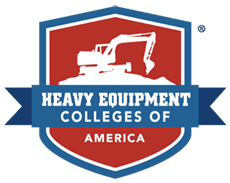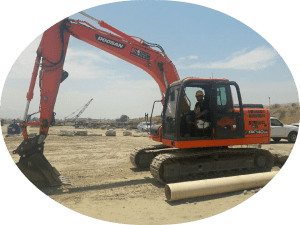Let’s face it. Life used to be simpler. You went to high school and got your diploma, then entered the real world and got a real job. Or maybe you continued on with your education, earned a college degree, and then headed out to start your career. You may have received some other formal training along the way. But if you’re like most people, the only serious training you got after your school days was of the on-the-job variety.
That was then, though, and this is now. And now is more complicated. Today, employers expect more of their employees, even those who’ve been working for the same company for years. The world moves faster and you’ve got to keep up. That’s true for anyone in any job – even for heavy equipment operators.
A great way to keep up is through continuing education programs and courses. If you’re a heavy equipment operator – and interested in staying at the top of your game – it may be time to look into continuing education. Here’s how.
What is continuing education?
Everyone’s heard the term “continuing education”, but not everyone knows exactly what it means. That’s because it really has no exact definition. It practical terms, continuing education refers to almost any form of formal post-secondary education or training program. While continuing education is most closely associated with post-secondary programs, it’s important to know that, in many cases, holding a college or high school diploma is not a prerequisite to participation in a continuing education courses or training.
What does continuing education have to do with being a heavy equipment operator?
If you consider yourself a highly-trained and experienced heavy equipment operator, you might be asking yourself, “What does continuing education have to do with me?” It is true that jobs in the heavy equipment field often require little or no formal education. A high school diploma – and sometimes not even that – is just about all that’s necessary in many instances to land an entry-level heavy equipment position. On-the-job training – that’s how most operators get their education.
Until now, at least. Times have changed in the workaday world, and that world includes the construction business and heavy equipment operators. As with any other occupation, employers of heavy equipment operators are, more and more, seeking employees who are better educated, and have a broader knowledge base and better understanding of all aspects of the construction business.
Ways in which heavy equipment operators benefit from continuing education.
- It keeps you up-to-date on the current state of health and safety rules, regulations and issues. Continuing education courses keep workers informed on the latest rules and regulations governing construction site and heavy equipment safety, including applicable Occupational Safety and Health Administration (OSHA) standards. And regardless of any changes in the rules, it never hurts to refresh your knowledge of equipment operation and worksite safety.
- It keeps you up-to-date on the latest advances in equipment features and technology. Important advances in equipment technology are occurring all the time and they’re happening at a faster rate. Employers need workers who know how to operate the latest features of their equipment, and continuing education can provide that knowledge.
- It broadens and advances your job skills set.
There are three basic ways that continuing education can expand and improve your job skills:
- Equipment operation: Employers like operators who can handle more than one type of equipment. Continuing education classes can teach you to operate a variety of equipment types, including those that demand higher pay.
- Skills beyond the cab: Technology is changing the way work is done both inside and outside the cab. Construction site supervision and communications today, for example, employ a wide range of cutting edge tools, devices and applications. It’s to your great advantage to know how to use them.
- It can help you advance your career – big time. Continuing education for heavy equipment isn’t limited to improving your operator skills. It can also help you gain the knowledge and skills you need to move up the career ladder and into supervisory, and even executive, positions. Courses are available in a number of business-related subjects – like project management, human resources, finance, technology – and many, many more.
Where can I find continuing education courses?
Continuing education programs and classes can be found in a number of places:
- Junior and community college campuses: Local junior and community colleges are a great source of continuing education opportunities. Both credit and non-credit courses are commonly available, and courses can usually be taken individually or as part of a license, certification, or degree-earning program. Many of these schools offer classes designed specifically for construction-related occupations, and some offer programs specifically for heavy equipment operators.
- Technical and specific occupation-focused schools: In the past, these types of institutions were known as “vocational schools”. Not so much anymore.
- Technical schools and those offering training for specific occupations are now home to highly respected programs offering first-class education and training for any number of careers, including heavy equipment operation. For example, Heavy Equipment Colleges of America (HEC) provides training on a variety of types of heavy equipment, including preparation courses for NCCCO certification for crane operation, at campuses throughout the U.S.
- University extension programs: Many schools sponsor continuing education courses through what are commonly known as “university extension” or “college extension” programs. Courses are typically offered at night or on weekends to accommodate working students.
- Employer-sponsored programs: Many employers, particularly larger ones, often provide access to continuing education related to their specific businesses. Sometimes referred to as “corporate training”, employer-sponsored courses are commonly presented “in-house” (i.e., on the premises of the business) but may also require the student to travel to a nearby college campus or training center. Participation by employees may be either mandatory or voluntary, but attendance is often looked upon as a big plus by most employers.
- Union-sponsored programs: Unions realize the importance of keeping their members informed of all of the latest developments in their respective fields. For some workers, a certain amount of continuing education is required to keep their licenses or certifications from expiring or being suspended. Unions often provide access to courses and programs for this purpose, also.
Industry/occupation associated conferences: Continuing education courses and seminars are sometimes offered as part of industry, occupation or business-related trade shows and conferences.
The bottom line.
Look, there’s nothing wrong with being happy with your current job and wanting to just keep doing what you’re doing now. But the problem is that staying where you’re at today demands keeping up with changing times. And for anyone interested in moving up the career ladder or on to a new job, it’s important to give employers a reason to hire you over someone else – someone who may have more to offer in terms of knowledge and training. Continuing education may be the solution to the problem.

